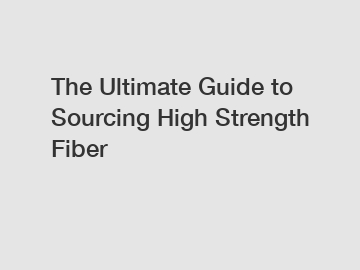The Ultimate Guide to Sourcing High Strength Fiber
When it comes to sourcing high strength fiber, it's important to consider a variety of factors in order to find the best material for your specific needs. From aerospace to automotive to sporting goods, high strength fibers have become a staple in many industries due to their exceptional strength-to-weight ratio and durability. In this comprehensive guide, we will explore the different types of high strength fibers available on the market, their properties, and key considerations when sourcing these materials.
Aramid fibers are one of the most popular choices for high strength applications due to their incredible strength and heat resistance. Developed in the 1960s, aramid fibers are commonly used in body armor, bulletproof vests, and high-performance ropes. Two of the most well-known aramid fibers are Kevlar and Twaron, both of which offer excellent tensile strength and abrasion resistance. When sourcing aramid fibers, it's important to consider factors such as fiber diameter, tensile strength, and elongation at break to ensure the material meets your specific requirements.
Another popular high strength fiber is carbon fiber, known for its exceptional stiffness, strength, and light weight. Carbon fibers are often used in aerospace, automotive, and sporting goods applications where high strength-to-weight ratios are critical. When sourcing carbon fibers, it's important to consider factors such as fiber modulus, tensile strength, and fiber orientation to ensure the material meets the performance requirements of your application.

High modulus polyethylene (HMPE) fibers, such as Dyneema and Spectra, are another excellent choice for high strength applications. These fibers offer superior strength, abrasion resistance, and low elongation, making them ideal for applications where lightweight, high strength materials are required. When sourcing HMPE fibers, it's important to consider factors such as fiber denier, tensile strength, and modulus to ensure the material meets the performance requirements of your specific application.
In addition to aramid, carbon, and HMPE fibers, there are several other high strength fibers on the market that offer unique properties and benefits. For example, glass fibers are commonly used in construction, automotive, and marine applications due to their high strength and corrosion resistance. Ceramic fibers, such as alumina and silicon carbide, are known for their high temperature resistance and chemical stability, making them ideal for aerospace and industrial applications. When sourcing high strength fibers, it's important to consider the specific properties and performance requirements of your application to ensure the material meets your needs.
When sourcing high strength fibers, it's also important to consider the manufacturing process and quality control measures of the supplier. Look for suppliers with a track record of producing high quality fibers and a commitment to continuous improvement. Make sure the supplier has the necessary certifications and complies with industry standards to ensure the material meets your performance requirements.
In addition to material properties and supplier capabilities, it's also important to consider factors such as cost, lead time, and availability when sourcing high strength fibers. Consider working with a trusted supplier who can provide guidance and support throughout the sourcing process to ensure you find the best material for your specific application.
In conclusion, sourcing high strength fibers requires careful consideration of material properties, supplier capabilities, and performance requirements. By understanding the different types of high strength fibers available on the market and key considerations when sourcing these materials, you can find the best material for your specific application. Remember to work with a trusted supplier who can provide guidance and support throughout the sourcing process to ensure you find the best high strength fiber for your needs.
The company is the world’s best Putty Powder Raw Material Manufacturer, China hydroxypropyl starch ether, gypsum retarder solution supplier. We are your one-stop shop for all needs. Our staff are highly-specialized and will help you find the product you need.
If you are interested in sending in a Guest Blogger Submission,welcome to write for us!




Comments
0